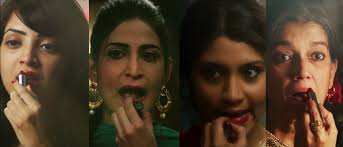
After a painfully long journey to the movie screens, Lipstick Under My Burkha is creating a stir with its ‘woman-oriented’ portrayal of sexuality. An overwhelming opposition to CBFC’s Pahlaj Nihalani’s refusal to accept female sexuality helped bring the movie much more than its share of media attention. Some appreciate the well-rounded strong female leads, some say the film falls short of being feminist.
But this film has given us the ability to analyse the male characters completely from a female perspective. The men are one-dimensional, spineless, and only exist to further the plots and characters of the women. We analyse Woody Allen’s women, we criticise Karan Johar’s pseudo-progressive heroines. So why not take a look at Alankrita Shrivastava’s men?
Rahim Aslam, Shirin’s husband (Sushant Singh)
Rahim, Shirin’s abusive, cheating husband is himself a victim of patriarchy. He is supposed to be the bread-winner of the family. He is supposed to have a career. In spite of being a failure at that, he continues to take advantage of a social structure that lets him abuse his wife’s body and mind without even taking up the responsibility of contraception. He has children, but since it is his wife’s responsibility to carry them and look after them, the number of offsprings is a minor detail to him. He doesn’t see Shirin as a person. To him she is a slave, bound to him by holy matrimony. He is having an affair with another woman and treats her with a little more respect, only because she has no obligation to him and isn’t ‘his’ to bully and harass.
Dhruv, Rihanna’s boyfriend (Shashank Arora)
Dhruv’s musical talent and confident demeanour attract a lot of female attention, and he’s well aware of his sexuality. He impregnates a girl, swiftly moves on to another (Rihanna). He neither has to worry about pregnancy, nor about society denying him control of his sexuality. His self-assuredness at such a young age makes other youngsters believe he is ‘cool’, and many of his impressionable and vulnerable peers (much like Rihanna) will act according to what he thinks is agreeable behaviour. As long as women are attracted to him, he can go on without developing any other aspects of his personality.
Arshad, Leela’s boyfriend (Vikrant Massey)
Arshad has strong feelings for Leela. He also judges her for her sexual liberty. Arshad does feel possessive about Leela, but leaves all the hard work of gathering money and planning an escape to her. He dislikes her being close with the man she’s arranged to get married to, but will happily flirt with the foreigner woman walking into his photo studio. He is unsure whether he wants to fight for Leela, judge her, or run away with her. But he’s sure he will not take too much effort in whatever he chooses.
Manoj, Leela’s fiance (Vaibbhav Tatwawdi)
Manoj is the ‘good guy’: the polite, family-oriented and obedient man. He is getting married at the right age, to a woman chosen by his family. He feels lucky that he is with an attractive woman, though he knows nothing much about her personality. He believes whatever feistiness is left in her will soon get subdued after she ‘settles down’ with him. However, he is vastly less entitled than Shirin’s husband. Manoj would probably never take advantage of his wife’s body or yell at her.
He assumes she will not work after marriage, because he will be providing her all she needs. He doesn’t believe there are women who work, smoke or have sex before marriage. Even if they do exist, he’s been taught to judge them as being of questionable character.
Jaspal, Usha’s love interest (Jagat Singh Solanki)
Jaspal works hard on his body, and loves himself. When he starts getting erotically charged phone calls, he assumes they’re coming from a nubile woman around his own age. He treats Usha, the old lady who comes to learn swimming, with respect. But he doesn’t imagine her as a sexual being. When he realises that he had been having phone sex with a woman way past her prime, it hurts his masculine ego. He is enraged that the ‘affair’ he willingly participated in did not adhere to his notion of beauty and sexuality. He thinks he deserves better quality female attention. So he does all he can with the power that society assigns him. He initiates the public shaming of Usha. He knows she would have no power or say in this; he has nothing to lose. He’s a ‘victim’.
Special mention: The mob that shames Usha
This mob, consisting of both men and women, is the self-assigned moral police, the saviour of ‘tradition and decency’. They turn against their Usha buaji, a woman they revered and worshipped until she was proven to have sexual urges. What enraged them further was that she read erotic books instead of spiritual ones. She broke away from their concept of what an old lady should be. It would be unfair to assign a gender to this mob. However, this mob is unfair, and a danger only to one gender.
